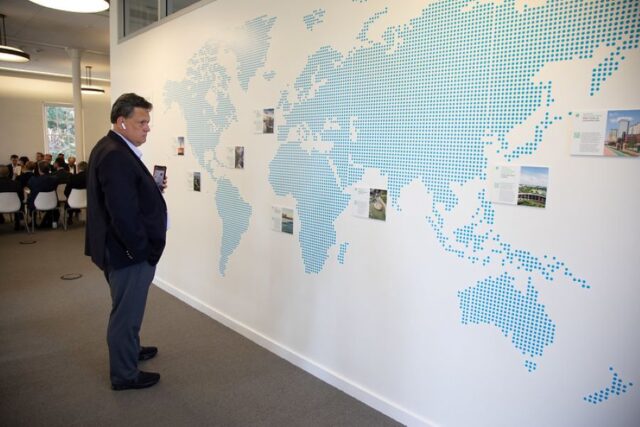

…Over 250 government, business and civil society leaders, spanning six continents, 30+ countries and 20+ industries, gathered in San Francisco to advance public and private sector investment in cities and local economies.
…At the Urban Transformation Summit, leaders explored the potential of innovative financing to address the climate crisis and how nature can safeguard urban prosperity and actionable strategies for integrating social value into redevelopment.
…Three cities – Bristol, Monterrey and Pittsburgh – were recognized for world-leading initiatives that have harnessed the power of public-private collaboration to improve the lives of residents, protect the environment and foster inclusive economic growth.
TUE OCT 29 2024-theGBJournal| Business leaders and policy-makers gathered at the World Economic Forum’s fourth annual Urban Transformation Summit on 21-23 October 2024 to address the increasingly critical role of cities in today’s shifting geopolitical landscape.
Cities, which generate over 80% of global GDP, are pivotal in driving global growth and stability. Not only are they economic powerhouses, but also the burgeoning homes of the world’s population and vital hubs of talent able to address complex challenges.
“In a world often fraught with division, cities provide a beacon of light and hope for a better future where businesses, governments and communities can work together to not simply find common ground, but help address some of the most pressing global challenges,” said Jeff Merritt, Head of Urban Transformation at the World Economic Forum.
Public-private collaboration is transforming cities and local economies. In many communities, the demand for city services frequently outpaces tax revenue. Private sector investment can help bridge this gap, with emerging markets poised to attract over $3.1 trillion in funding for renewable energy, public transportation, waste and water by 2030. Private sector know-how and collaboration are also critical for the sustained economic recovery and transformation of cities.
“If by 2050, 70% of us live in cities, and if less than a third of those cities have a climate and health plan, then by 2050 we have a massive amount of humanity that is flying blind in the face of climate and health challenges,” said Lauren Sorkin-Yeo, Executive Director of the Resilient Cities Network. “All city leaders must anticipate the nexus of climate and health and bring predictive capacity, tools and solutions into that space.”
“We need to put local communities at the forefront and remember that one size is not going to fit all,” added Mark E. Rose, Chair and Chief Executive Officer of Avison Young. “Many of the conversations that we have, seek out global answers to everything when, quite honestly, most of what we do is local. It’s regional, it’s by city or it’s by state.”
This year, the Global Partnership for Local Investment, an initiative of the World Economic Forum in collaboration with UN-Habitat, recognized three public-private collaborations at the summit for their ground-breaking work to accelerate green energy investment in Bristol (UK), empower entrepreneurs to support urban transformation in Monterrey (Mexico), and reduce congestion and vehicle emissions in Pittsburgh (USA):
-Bristol City Leap is a 20-year joint venture between Bristol City Council, Ameresco and Vattenfall Heat UK, aimed at reducing Bristol’s carbon emissions through low-carbon energy infrastructure. The initiative is projected to generate £61.5 million ($80 million) in social value, £55 million ($71 million) in local contracts, and over 1,000 local jobs, work placements and apprenticeships.
-DistritoTec is an ambitious urban regeneration project led by Tecnológico de Monterrey (Tec) in collaboration with the City of Monterrey and the local community that was initiated to address rising crime, population decline, economic stagnation and limited growth opportunities in communities surrounding the university.
Over a 10-year period, DistroTec has attracted 18 billion pesos ($900,000) in private investment and 133 million pesos ($16 million) in public realm improvements across 24 neighbourhoods. The results are a 56% population increase, a 27% rise in new housing, a 69% reduction in uninhabited dwellings and a 40% increase in registered economic units.
-Smart Curbs is an automated curb management solution developed in collaboration between the City of Pittsburgh and Automotus to address the growing number of commercial vehicles on city streets that have increased emissions, congestion and safety hazards.
The initiative, which uses private-by-design computer vision technology to enforce parking regulations, resulted in a 41% reduction in double parking, a 12 metric ton decrease in emissions per zone, and electric vehicle adoption in these zones outpaced national rates by 4.7 times.
In the lead-up to the summit, the World Economic Forum released a series of five new toolkits to help accelerate public-private collaboration to address pressing social, economic and environmental challenges in cities:
-Scaling Investment in EV Charging Infrastructure: A Policy Roadmap for Cities outlines key interventions that city governments can make to foster an attractive environment for private sector investment in electric vehicle infrastructure.
-Improving Social Outcomes in Urban Development: A Playbook for Practitioners provides policy recommendations, tools, criteria and best practices to help stakeholders involved in urban development projects create greater social value.
-Adaptive Reuse of Assets: A Model Policy for Cities helps cities prioritize existing built assets, which are vacant, underutilized, or stranded over new construction to reduce their carbon footprint and maximize community benefit in urban development.
-Implementing a Life-Cycle Approach to Infrastructure: A Policy Roadmap for Cities explains how cities can advance more sustainable, well-maintained and affordable infrastructure by adopting a holistic approach to financing, planning, construction and long-term maintenance of these projects.
-Nature Positive: Leaders’ Insights for the Transition in Cities highlights both the challenges and successes of integrating nature into the urban fabric, offering practical solutions that can be adapted to various cityscapes.
Innovation is key for cities to achieve sustainable, inclusive growth
Cities consume over 78% of the world’s core energy and generate 70% of carbon emissions. Meanwhile, over 90% of urban areas are situated in coastal regions where the impacts of climate change have been most severe.
“We can build better communities in the world if we deliberately drive innovative technologies to respond to the climate challenges, said Mmamoloko Kubayi, Minister of Human Settlements for the Republic of South Africa. “Governments must create new strategies to procure innovative technologies and should be the early adopters of those technologies to support the market for innovative solutions.”
To help provide a model for sustainable and inclusive growth, the World Economic Forum collaborated with Deloitte, Salesforce, Citi and the San Francisco Chamber of Commerce to establish the Yes San Francisco (Yes SF) Urban Sustainability Challenge. Yes SF played a central role in this year’s summit with participants joining city officials and community leaders for behind-the-scene tours of innovative projects across San Francisco.
Since its launch in June 2023, Yes SF has forged a cross-sector coalition of nearly 30 organizations – global and local – to support a growing community of sustainability entrepreneurs in San Francisco, and partnered with local government and businesses to ease the deployment of new urban solutions across the city.
“Yes SF has shown how growing our sustainable business ecosystem can also be a boon to recovering downtowns,” said London N. Breed, Mayor of San Francisco. “We are proud to host a model that can now be replicated in other major cities, and to help grow new business partners dedicated to urban innovation.”
“Collective action is no longer a choice, it’s an imperative,” said Kwasi Mitchell, Chief Purpose and DEI Officer of Deloitte. “We have an immediate opportunity to help build coalitions across sectors and industries to significantly scale impact and positive change in our cities. We hope that Yes San Francisco will provide inspiration for cities across the globe.”
At the Urban Transformation Summit, five urban innovation hubs – Mumbai, Monterey, Miami-Dade, Detroit and Riyadh – committed to helping scale learnings from San Francisco and co-design a new model for sustainable economic growth rooted in public-private collaboration.
Over the next year, the cities will partner with the Alliance for Urban Innovation to build coalitions of local and global stakeholders, accelerating investment in the green economy within their regions while also exchanging insights and carving out their unique value proposition and thematic focus in this expansive field of climate action and innovation.
Tourism boom presents unique opportunity to uplift communities and accelerate climate action. The travel and tourism sector finds itself at a crucial crossroads. The COVID-19 pandemic resulted in a staggering loss of $1 trillion in revenue and a global decline of over 70% in tourist arrivals.
Today, international tourist arrivals have not only rebounded to pre-pandemic levels, but countries like Saudi Arabia are experiencing unprecedented growth in their tourism sectors.
Managing this growth will require new strategies to keep up with demand, bolster resiliency and ensure that tourism serves as a positive force for all communities. Global leaders from across key segments of the travel journey – including transportation, airport infrastructure, travel management companies, hospitality, tourism experiences and online payment systems – convened at the Urban Transformation Summit to chart a new course towards more sustainable and inclusive growth for the sector.
“This week’s commitment to transforming the travel and tourism sector is a testament to our collective responsibility towards sustainable development,” said H.E. Ahmed Al-Khateeb, Minister of Tourism for the Kingdom of Saudi Arabia. “As we navigate the complexities of the 21st century, it is imperative that we adopt practices that not only protect our environment but also foster economic growth and opportunity. Saudi Arabia is proud to be part of this global effort, and we are dedicated to implementing these transformative actions to ensure a prosperous and inclusive future for all.”
Insights from the summit will shape the World Economic Forum’s work throughout the coming year, and further dialogue at the Annual Meeting 2025 in Davos.
X-@theGBJournal|Facebook-the Government and Business Journal|email:gbj@govbusinessjournal.com|govandbusinessj@gmail.com









